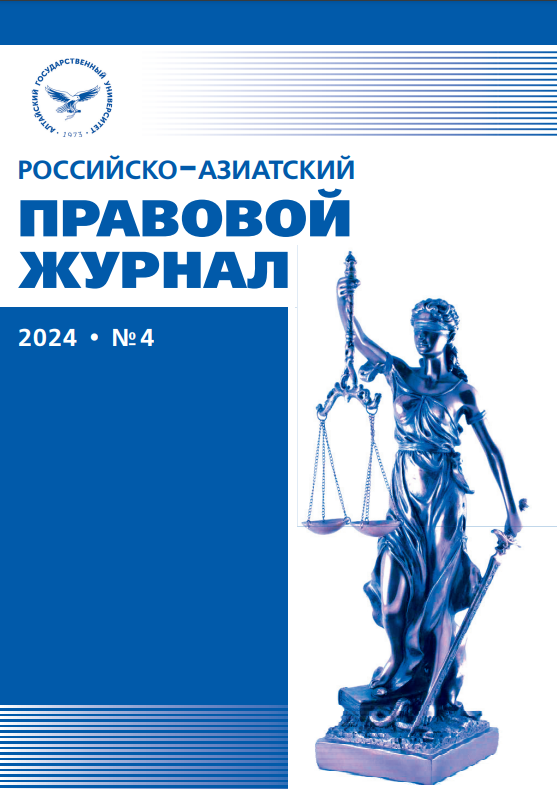ON THE ISSUE OF CLARIFYING THE FACTORS OF UNIVERSALITY AND ORIGINALITY IN THE CONSTITUTIONAL LAW OF RUSSIA
УДК 342 ББК 67.400
Abstract
The stated study attempts to characterize the factors that influence the formation of «constitutionaluniversality» and «constitutional identity» in the legal environment of the Russian Federation. The authorconsiders the reasons for universality in Russian constitutional law to be the processes of globalization, theexpansion of economic cooperation between different countries, which lead to the borrowing of normsand the creation of general rules of behavior with their further integration into the current regulatory legalacts of the «participants» of relations, that is, internationalization, and also strengthening informatization.The researcher attributes continuity and cyclicality of the constitutional and legal development of Russia, the constitutional and legal tradition and national constitutional psychology to the same reasons thatdetermine constitutional originality (dissimilarity with other states). As a result of summarizing the sources,the researcher believes that it is possible to classify the identified factors into external and internal, legaland extra-legal, clarifying that it is the latter that most clearly demonstrate the originality of domesticconstitutional law.
Downloads
References
Олейников С.Н., Шестопал С.С., Турянская Е.С. Динамика современного законодательства: типичные (классические) и нетипичные факторы содержательной эволюции // Балтийский гуманитарный журнал. 2019. Т. 8, №3 (28). С. 213–219.
Архипов С.И. Правовое будущее России. Часть 2: Цивилизационный выбор // Российский юридический журнал: Электронное приложение. 2022. №4. С. 5–26.
Марченко М.Н. Основные тенденции развития российского государства и права на современном этапе // Lex Russica (Русский закон). 2018. №5 (138). С. 19–32.
Конституции зарубежных государств: Великобритания, Франция, Германия, Италия, Европейский Союз, Соедин. Штаты Америки, Япония, Индия: учебное пособие / [сост. сб., пер., авт. введ. и вступ. ст. В.В. Маклаков]. 5-е изд., перераб. и доп. М. : Волтерс Клувер, 2006. 608с.
Конституция Российской Федерации (принята всенародным голосованием 12.12.1993 с изменениями, одобренными в ходе общероссийского голосования 01.07.2020): Официальный текст Конституции РФ с внесенными поправками от 14.03.2020 опубликован на Официальном Интернет-портале правовой информации. URL: http://www.pravo.gov.ru, 04.07.2020. (дата обращения: 29.05.2024).
Лукьянова Е.Г. Правовая система России: современные тенденции развития // Труды Института государства и права РАН. 2016. №6. С. 6–23.
Саурин А.А. Цифровизация как фактор трансформации права // Конституционное и муниципальное право. 2019. №8. С. 26–31.
Окинавская хартия Глобального информационного общества. URL: http://www.kremlin.ru/ supplement/3170 (дата обращения: 29.05.2024)
Аничкин Е.С., Бочарова Н.В. Особенности факторов развития конституционного законодательства Российской Федерации // Юристъ-Правоведъ. 2015. №6 (73). С. 81–87.
Баранова О.В. Факторы развития современного российского права // Социально-гуманитарное обозрение. 2019. №3. С. 26–30.
Скуратов Ю.И. Евразийская парадигма России и современные проблемы ее конституционноправового развития : монография. М. : Проспект, 2021. 416 с.
Аничкин Е.С., Матаева М.Х. Конституционная психология в российской среде // Актуальные вопросы общей и юридической психологии: образование, право и социальные практики: материалы Международной научно-практической конференции / под ред. Е.С. Аничкина, А.А. Васильева, Д.В. Каширского, Н.В. Сабельниковой. Барнаул, 2018. С. 187–191.
Дорская А.А. Правовые традиции России и развитие права международных организаций: проблемы взаимовлияния : монография. СПб. : Астерион, 2016. — 246 с.
Денисов С.А. Конституционная цивилизация и Россия // Зиновьевские чтения «Я глубоко русский человек…» (к 100-летию А.А. Зиновьева) : материалы Международного научного форума, посвященного 100-летию со дня рождения выдающегося российского мыслителя и писателя А.А. Зиновьева / ред.-сост. А.В. Зябликов. Кострома, 2023. С. 68–74.
Денисов С.А. Конституционная психология как наука // Конституционное и муниципальное право. 2022. №6. С. 3–9.
Пристенский В. Н. Проблема универсальности права, ее философско-антропологический смысл // Философия права. 2007. №3 (22). С. 25–29.
Copyright (c) 2024 Т.И. Ряховская

This work is licensed under a Creative Commons Attribution 4.0 International License.
Russian-Asian Law Journal is a golden publisher, as we allow self-archiving, but most importantly we are fully transparent about your rights.
Authors may present and discuss their findings ahead of publication: at scientific conferences, on preprint servers, in public databases, and in blogs, wikis, tweets, and other informal communication channels.
Russian-Asian Law Journal allows authors to deposit manuscripts (currently under review or those for intended submission) in non-commercial, pre-print servers such as ArXiv.
Authors who publish with this journal agree to the following terms:
- Authors retain copyright and grant the journal right of first publication with the work simultaneously licensed under a Creative Commons Attribution License that allows others to share the work with an acknowledgement of the work's authorship and initial publication in this journal.
- Authors are able to enter into separate, additional contractual arrangements for the non-exclusive distribution of the journal's published version of the work (e.g., post it to an institutional repository or publish it in a book), with an acknowledgement of its initial publication in this journal.
- Authors are permitted and encouraged to post their work online (e.g., in institutional repositories or on their website) prior to and during the submission process, as it can lead to productive exchanges, as well as earlier and greater citation of published work (See The Effect of Open Access).








